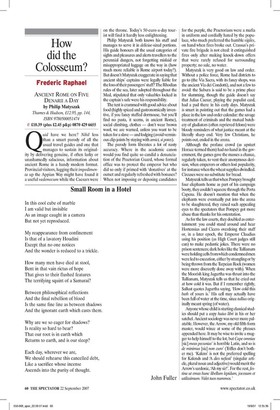How did the Colosseum?
Frederic Raphael ANCIENT ROME ON FIVE DENARII A DAY by Philip Matyszak Thames & Hudson, £12.95, pp. 144, ISBN 9780500051474 £1039 (plus £2.45 p&p) 0870 429 6655 Quid have we here? Nihil less than a smart parody of all the usual travel guides and one that manages to sustain its originality by delivering genuine, if often larky or unashamedly salacious, information about ancient Rome in a handy modern format. Provincial visitors, lugging their impedimenta up the Appian Way might have found it a useful vademecum while the Caesars were on the throne. Today's 50-euro-a-day tourist will find it hardly less enlightening.
Philip Matyszak both knows his stuff and manages to serve it in deliciae-sized portions. His guide honours all the usual categories of sights and pleasures and alerts travellers to the perennial dangers, not forgetting mislaid or misappropriated luggage on the way in (how much more reliable is Rome airport today?). But doesn't Matyszak exaggerate in saying that ancient ships' captains were legally liable for the loss of their passengers' stuff? The Rhodian rules of the sea, later adopted throughout the Med, stipulated that only valuables locked in the captain's safe were his responsibility.
The text is crammed with good advice about food (highly spiced and gastronomically inventive, if you fancy stuffed dormouse, but you'll find no pasta, it seems, in ancient Rome), social climbing, clothes — don't wear brown wool, we are warned, unless you want to be taken for a slave — and lodging (avoid verminous clip-joints by staying with amici, si potes).
The parody form liberates a lot of nasty accuracy. Where in the academic canon would you find quite so candid a denunciation of the Praetorian Guard, whose formal office was to protect the emperor but who did so only if primed with 'clonatives' at the outset and regularly refreshed with bonuses? When not imposing or deposing candidates for the purple, the Praetorians were a mafia in uniform and cordially hated by the populace, who much preferred the humble vigiles, on hand when fires broke out. Crassus's private fire brigade is not cited: it extinguished fires only after making knock-down offers that were rarely refused for surrounding property; no sale, no water.
Matyszak is very good on law and order. Without a police force, Rome had districts to go to (the Via Sacra, with its fancy shops, was the ancient Via dei Condotti), and not a few to avoid: the Subura is said to be a prime place for slumming, though the guide doesn't say that Julius Caesar, playing the populist card, had a pad there in his early days. Matyszak is smart in pointing out that the games had a place in the law and order calendar: the savage treatment of criminals and the mutual butchery of gladiators (often reprieved felons) were bloody reminders of what justice meant at the literally sharp end. Very few Christians, he points out, ended in the arena.
Although the profane crowd (as upstart Horace termed them) had no hand in the government, the games gave the masses a chance, regularly taken, to vent their anonymous derision, when emperors or others lost popularity, for instance when the wheat supplies dwindled. Circuses were no substitute for bread.
Matyszak tells us that when Pompey brought four elephants home as part of his campaign booty, they couldn't squeeze through the Porta Capena. He doesn't mention that when the elephants were eventually put into the arena to be slaughtered, they raised such appealing eyes to the spectators that Pompey got more abuse than thanks for his ostentation.
As for the law courts, they doubled as entertainment: you could stand around and hear Hortensius and Cicero overdoing their stuff or, in a later epoch, the Emperor Claudius using his position (as High Court judges still can) to make pedantic jokes. There were no prison sentences; dark holes like the Tullianum were holding cells from which condemned men were led to execution, either by strangling or by being thrown from the Tarpeian Rock (women were more discreetly done away with). When the Moorish king Jugurtha was thrust into the Tullianum, Matyszak tells us that he cried out at how cold it was. But if I remember rightly, Sallust quotes Jugurtha saying, 'How cold this bath of yours is.' His cell may actually have been full of water at the time, since tullius originally meant spring (of water).
Anyone whose child is starting classical studies should put a copy huius libti in his or her satchel. Ancient sociology was never more palatable. However, the Arrow, my old fifth-form master, would wince at some of the phrases appended here. It may be wise to invite a mugger to help himself to the lot, but Cape omnias [sic] meas pecunias' is horrible Latin, and so is de minimus [sic] non curo' (Trifles don't bother me). `Kalens' is not the preferred spelling for Kalends and 'A dies nefasti' (singular article, plural noun and adjective) would merit the Arrow's sardonic, Ah my sir!'. For the rest, festina ut emas hunc libellum lepidum, jocosum et utilissimum. Valet tuos nummos.'

































































 Previous page
Previous page